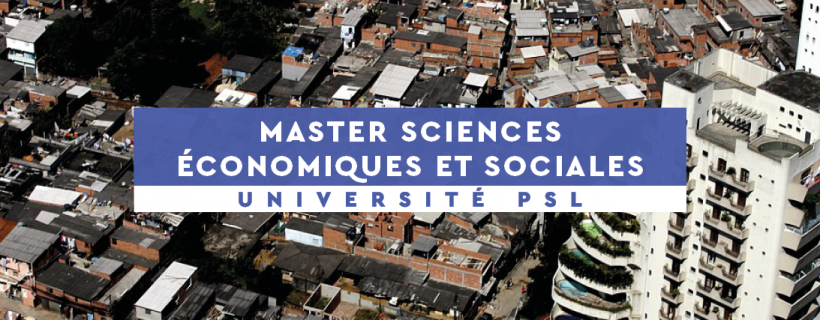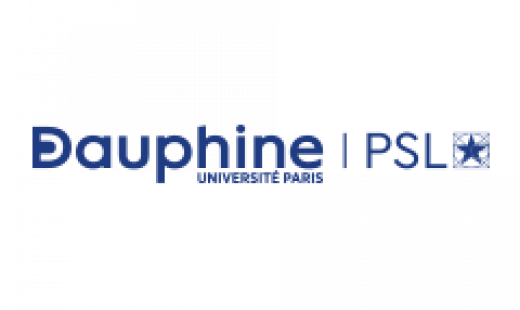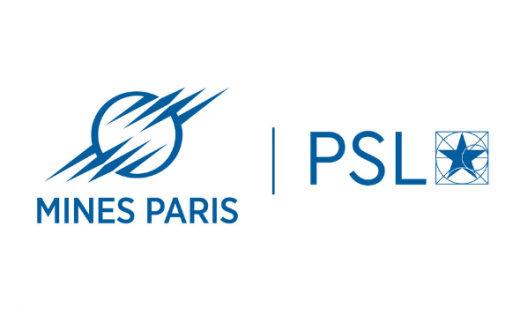Institutions, Organizations, Economics and Society

The “Institutions, Organizations, Economics and Society” Master’s degree program is the result of a collaboration between Dauphine - PSL, MINES Paris - PSL and the École des Hautes Études en Sciences Sociales (EHESS). This multidisciplinary program, rooted in a “learn by doing” approach to research, is designed to train a new generation of researchers and experts, able to provide fresh insight into the policies, institutions, organizations and other forces that play a critical role in the contemporary economy.
This master's degree is part of the graduate program in Social Sciences and the doctoral training in Social Sciences (PSL-EHESS).
Learning outcomes
- Train a new generation of highly-qualified scientific professionals capable of renewing the analysis of the policies, institutions, organizations and problems that underpin contemporary economiesTrain
- To follow an education, in French and in English in the 3 institutions, which combines the contributions of economic and social sciences
Tracks
A single track in M1 and M2: Economic and Social Sciences.
Opportunities
The master's degree is primarily addressed at students who wish to undertake a scientific career in higher-education or research institutions. They benefit from the reputation of Dauphine-PSL, MINES Paris-PSL and EHESS to bring them into international research networks so that they can pursue a doctorate.
Admission
Master 1 (M1)
- Requirements: undergraduate qualification (equivalent to the French national “licence” degree) in any of the following fields: economics, sociology, geography, history, political science, management, philosophy, engineering, environmental science. Candidates to the M1 program need to have previously undergone basic training in economics and in research methods, and demonstrate sufficient language proficiency in English and French.
- Applications:
- if you are a EU-citizen or if you are currently studying in France or in a EU-country university: via www.monmaster.gouv.fr
- if you are a non-EU citizen, residing in one of the countries applying the "Études en France" procedure: see "Études en France" application system of www.campusfrance.org
Master 2 (M2)
- Requirements: graduate qualification (equivalent to the French national “Master 1” degree) in any of the following fields: economics, sociology, geography, history, political science, management, philosophy, engineering, environmental science. Candidates to the M2 program need to have previously undergone advanced training in economics and in research methods, and demonstrate sufficient language proficiency in English and French.
- Applications: through the online application systems offered by Dauphine – PSL and/or the EHESS.
Recruitment Process
Two stages:
- examination of your application and especially of your research project (3 to 5 pages). The research project must include a research question, references and a proposal of method to address your question,
- oral interview with those who are declared eligible at the end of the first stage.
More information:
Teaching location
- Dauphine - PSL : Place du Maréchal de Lattre de Tassigny, 75016 Paris
- Mines Paris - PSL : 60, boulevard Saint-Michel, 75006 Paris
- EHESS : 54, boulevard Raspail, 75006 Paris
- EHESS : campus Condorcet
School for registration: Dauphine - PSL or EHESS
Degree delivered:National Master’s degree conferred by Université PSL.

- Mandatory courses are delivered by teams of highly-qualified researchers, proficient in various academic fields (economics, sociology, law, management, history, etc.).
- Classes are based on the discussion of concepts, problems and debates, which are dealt with from multiple disciplinary perspectives, emphasis is put on the critical reading of academic publications, and on student participation.
-
Training in quantitative and qualitative research methods is crucial, with a large array of practical work in statistics, the use of digital method, and training in data science.
- Close interaction with ongoing research is a rule, with a strong emphasis on original, empirical research (M1 and M2 research dissertations), and on access to research seminars at the research centers of EHESS and PSL University.
- Access to international research networks is a priority, a bilingual spirit is cultivated (teaching in French and English, skills in French are a requirement), resources for the organization of visits abroad (research internships, scientific fieldwork).
- Close tutorship is offered, including academic guidance, dissertation supervision, and help with career development and doctoral perspectives.
Contact
Marlène Benquet, Dauphine - PSL
Eve Chiapello, EHESS
Any questions: admissions-master-ioes@psl.eu
Further information
Stay in touch
Find your course
- By degree
- Bachelor's
- Master's
- PhD
- Other
- By discipline
- Anthropology
- Archeology
- Archives – Documentation
- Plastic Arts
- Astrophysics
- Banking - Finance - Insurance
- Chemistry
- Communications - Journalism
- Sustainable development
- Law
- Ecology
- Economics
- Entrepreneurship
- Géographie
- Géographie politique
- Géosciences
- Geosciences
- Business Administration - Management
- History
- Art History
- Digital Humanities
- Computer Science
- Languages
- Literature
- Marketing
- Mathematics
- Mechanics and Materials
- Médecine
- Fashion and design
- Philosophy
- Physics
- Human Resources
- Health - Medecine
- Political Science
- Cognitive science
- Space Science
- Earth sciences
- Engineering Science
- Data Science
- Sciences du climat
- Life Sciences
- Religious sciences
- Social Science
- Sociology
- Drama
- Quantum engineering



